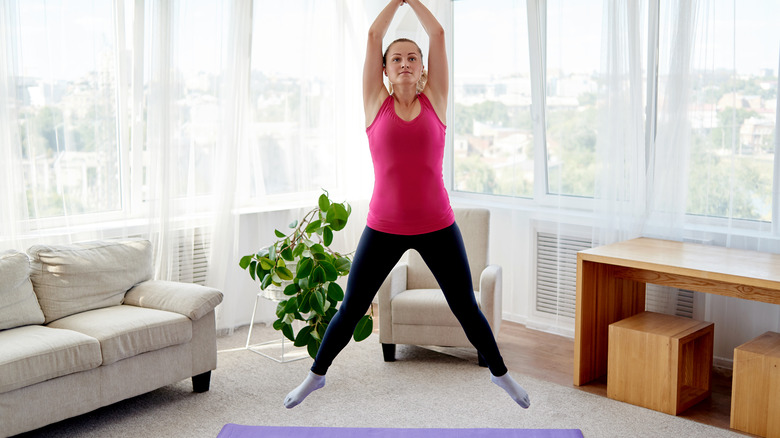What Happens To Your Body When You Do Jumping Jacks Every Day
Jumping jacks are one of the easiest ways to work up a sweat from anywhere. This exercise works your entire body and offers plenty of health benefits as a result. Here's what would happen if you did jumping jacks every day.
Jumping jacks fall within a group of exercises called plyometrics. Also referred to as jump training, these workouts combine aerobics and resistance to work your muscles very hard in short bursts. This means you're working your heart, lungs, and muscles all at once (via Healthline).
Doing jumping jacks every day will improve your cardiovascular health. In fact, according to Insider, people who perform high-intensity circuit training programs that include this exercise may develop lower resting heart rates, blood pressure, and cholesterol levels. They can also see a decrease in body fat. Insider also reported that jumping jacks have been shown to improve bone density over time, which is how the strength of bones is measured. This exercise can also reduce the risk of people developing osteoporosis as they get older.
Jumping jacks burn a lot of calories
Because they work your entire body, this exercise is great for people looking to lose weight and body fat. Depending on your age, weight, and sex, jumping jacks can burn between 8 and 16 calories per minute (via Healthline). And doing only 10 minutes of this exercise per day can burn an extra 100 calories in a day for some people.
While jumping jacks are generally safe for people of all ages, there are some risk factors to take into account before you start doing them every day. People with lower body injuries or pain in their feet, ankles, or knees should talk with their doctor before adding this exercise to their routine as it can make these factors worse. When working out at home, do your jumping jacks on the carpet or a padded surface to soften your landing. If you're at the gym, use a mat. This will help you avoid putting excess stress on your lower body and will reduce your risk of injury.

